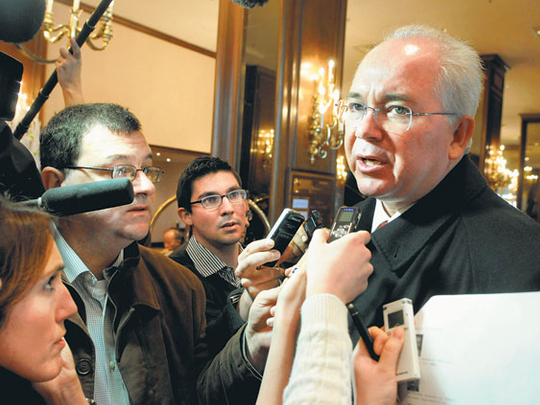
Dubai: Oil prices rebounded Tuesday from recent sharp losses as investors tracked rising stocks in cautious deals before a US interest rate decision on the eve of a meeting of the Organisation of Petroleum Exporting Countries (Opec) in Vienna Wednesday to discuss possible production level changes.
Oil demand in 2012 will be similar to 2011, Mohammad Bin Dha'en Al Hameli, the UAE Minister of Energy, said in Vienna. In midday trading, the price of Brent North Sea crude for delivery in January added $1 to $108.26 a barrel.
Weak outlook
New York's main contract, light sweet crude for January, advanced 74 cents to $98.51 per barrel.
Opec members who supply a third of the world's crude oil will decide on whether to raise the formal target of 24.845 million barrels per day (bpd) closer to its actual production of about 30 million bpd taking into consideration possible new sanctions that threaten Iran's oil output, a higher than expected output from Libya and a weak economic outlook for global markets.
"Growing consensus around the output roof of 30 million bpd is something which has been widely mentioned. Whether we actually see that number or whether it's trimmed to a different amount remains to be seen. We most certainly will not see a new agreement on country quotas," Samuel Ciszuk, a consultant at KBC Process Technology, told Gulf News.
Rare agreement
Healthy production levels by Opec will help balance oil markets next year as demand growth slows, the West's energy watchdog International Energy Agency and Opec said yesterday, in a rare agreement.
The IEA and Opec had raised output to its highest level in more than three years, and the oil producer group said it was now pumping more than might be required next year.
"Our base case is seeing a relatively balanced market next year if Opec continues to produce at the levels they have been producing at over the last three or four months," said David Fyfe, head of the oil industry and markets division of the IEA.
According to Peter Grimsditch, editorial director at Oxford Business Group, out of the 4 million plus bpd of oil that Iran produces, around 35 per cent is for domestic consumption. If Iranian oil exports were completely cut it would mean a global shortfall of 2.5 million bpd.
"This is, of course, a significant number but far from a global disaster. Saudi Arabia alone has the ability and capacity to make up most of this shortfall," he said.
However, analysts believe that introducing these sanctions would not be in the best interest considering the weak economic outlook of the EU. "They won't be that popular with Opec as it will put the markets in an awkward position and it will almost inevitably put an upward pressure on oil prices," Ciszuk said.
What next?
Opec Ministers continued to signal yesterday that they hope and expect today's meeting will result in an accord on production levels. The most likely course of action is that Opec will decide to maintain current output.
Venezuela's oil minister said Gulf producers that boosted output after the Libya outage "have to reduce". Algeria also suggested that producers should consider cutting back. "We have to be very careful in the near future," Minister of Energy Yousuf Yousfi said.
— Agencies












